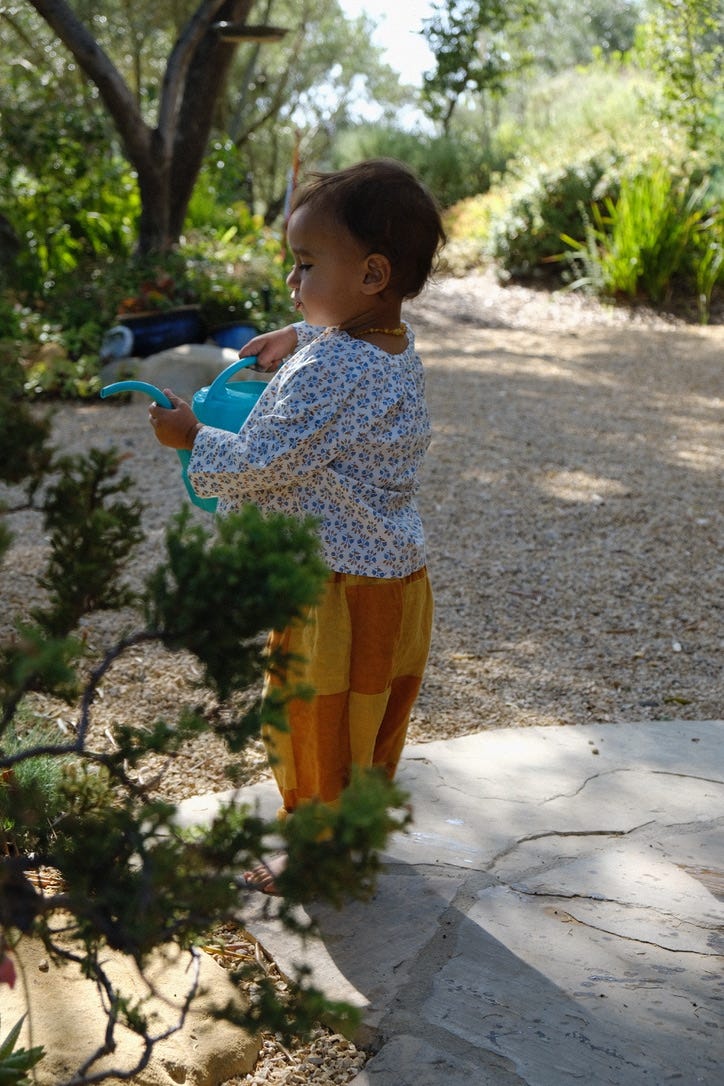It kind of feels like the world is falling apart. Just the other day I was feeling pretty down and so I put on Brené Brown’s podcast for some white-lady positivity vibes. She started by saying, “I’m losing my mind, I’m in such deep struggle, and I can’t access any joy.” And then I turned it off.
Regardless of your political affiliations, the last six years—starting with Trump and continuing now with the threat of nuclear war—have been a battering ram of destabilizing, polarizing, and exhausting challenges. It seems to me that nobody is sure what the rules are anymore, or who to listen to. The divisiveness we talk about in American society is often dumbed down to Democrat/Republican, but this fails to take into account that this divisiveness is occurring globally.
Honestly, I’ve written books faster than I have written this post. I had tons of trouble crystalizing my intentions here. It’s still a bit all over the place but I feel like there is value in the journey.
If it feels to you like some key threads of society are being unwoven, I hope that some of my observations in this post bring depth—instead of fear—to that sensation.
Let There Be Smite
I’m sure many conservatives feel like they are living in an upside-down world. After centuries of banishing people according to Biblical and Western (read: White) rules, the tables have turned. Now people are banished to the outskirts of society for behavior that used to be tolerated or even expected of them— being racist, sexist, violent, or just insensitive. These were all borderline virtues in the previous paradigm, so imagine waking up one day and being told all of your virtues are actually sins.
Conservatives mockingly call it cancel culture, but they are only bothered by it because they are forced to see with their own eyes the dreadful and ineffective style of conflict resolution that they themselves popularized. You know, the style of communication that dictates if someone has a different vision of society from you, then you must smite them.
In any society, accusing people of breaking rules seems necessary in order to keep people in line and keep the threads of society tightly drawn. But, if rules are applied rigidly or violently, you get authoritarianism, fascism, and other controlling -isms. While the mere idea that you need to “keep someone in line” kind of makes me cringe, I do believe that rules are what make a community strong—anarchist, democratic, fascist, or any other social organization needs their rules followed for cohesion.
But it seems to me that all rules are inherently conservative. That is, they conserve an agreement from the past. In that way, cancel culture is highly conservative in its guffawing about the correct way to be and think. It’s nothing new—it’s just an equal and opposite reaction to “traditional” culture. Is it more morally defensible? In my estimation, yes. But does that make it less evil? Not necessarily. The impact is more important than intention.
This is true, in part, because the shadow side of community rule following is non-consensual body and mind control. When a person in power or a group with political power sees a rule being violated, how do we address it? Often by controlling the person’s body or expression as retribution—banishing them out of the city, jailing them, stoning them, firing them, or canceling them via dissolution of their community connections and livelihood.
This is a tangential follow-up article to my previous post about non-violent communication and how anger and blame are reasonable feelings to have. So, in this post, I want to explore the concept of written and unwritten rules and how we have been taught to treat people that break those rules.
This installment got a little trippier than I expected because I needed to get lost in the weeds for a bit to figure out how exactly language—the main enabler of rules— came about and why.
The Third Chakra
I’ve always had a complex relationship with language. I love it, I do it for a living but I don’t trust anyone using it—myself included. I simply don’t trust that language is an adequate technology for explaining the wealth of information that rises up from the depths of human consciousness. Do you? When you’re sad do you feel like “I’m sad,” fully expresses the reality of your feeling? What if you wrote a whole book about your sadness—would that even come close to the resolution and truthiness of the feeling of the sadness itself? In this way, language seems dull and inefficient to me. I’m perpetually concerned with being misconstrued. At its very best and most exacting, language is incredibly limiting when it comes to expressing the fullness of actual experience.
In Tantra and Hindusim, the Third Chakra —often associated with the voice as well as listening—is really one of the most revered ways to commune with the divine, through chanting, recitations, singing, and listening. I know this is true, but for some reason, I still have a blockage from really achieving bliss through song or writing. For so long I’ve lived in the paradox of being a poet, singer, musician, writer, and editor who also thinks music and poetry and words are dumb and useless. I feel a very physical and metaphysical boundary in front of me. Why?
In part, I think I’m skeptical about the power of language because it comes so powerfully easy to me—and that scares me. My creative valves seem wide open but I don’t quite feel like drenching everyone around me. I feel like if I used words and my voice to their full potential, I would ruin the world—or worse, create a better one.
While that might seem weird or cocky to say, I feel I’m speaking for everyone. Honestly, I think in one way or another we all feel this terror when it comes to art and expression. We are all so close to realizing we are gods. I think perhaps that written and unwritten rules are the structures that stop us from feeling like gods with each breath. Gods, after all, do not stand in line.
Chanting and singing and writing words may bring us closer to the divine but will they ever break us through the boundary and show us the truth of our divinity? Will the miracle of life ever truly be captured in a song or poem?
Our Hallucinatory Reality
In the philosophy of consciousness, there is a term known as the rich phenomenology experience. All of us have a rich phenomenology experience. This exerience tells us that we are fully perceiving our surroundings. When we walk down a busy street, we have the phenomenal sensation that everything, every person, every street sign, and every color is being fully perceived and analyzed. This feeling makes us feel in control, but it’s an illusion. If someone were to stop us and quiz us on our surroundings, we would mostly have pathetic results. Suddenly, the street signs you felt so aware of would fall like sand between your fingers and you’d maybe be able to remember one or two of the signs, maybe only the size or color of another. The resolution would pale in comparison to the resolution you experienced yourself having.
This means that much of our peripheral vision is just a hallucination. Our eyes perceive disparate things and we fabricate a cohesive experience.
This is because our brains are energy-saving devices. They don’t waste time processing everything, they process what they think you need in order to be safe and achieve your goals. I believe this chasm of experience, and the innate requirement to lie to ourselves in order to “get shit done,” is externalized in the form of written and unwritten rules.
I believe that this personal version of a rich phenomenology experience emerges at the collective and societal level. Societies must lie to themselves a bit in order to stay safe and get shit done. As such, the hallucinatory nature of our peripheral vision is analogous to the illusion of certitude we have about who should and should not be canceled from society. We cancel people as a protective measure, we do it to save energy in the long run.
Language is an approximate science that mitigates our personal hallucinations in order to stabilize us within a collective reality. But that collective reality is actually just a new, shared hallucination—it’s the illusion of a unified viewpoint. It’s not that it’s completely made up, there is a reality to it, but again, it pales in comparison to the full experience.
The same goes for language. At the societal level, language is the processing system where we synchronize and cross-check our thoughts, feelings, hallucinations, and observations with others. In doing so, we externalize and immortalize our sensations. This was a great development in human history and certainly marked a new epoch for us, but perhaps it also marks the time when we lost control of our shit.
Language Is the Original Control System
Before written language, there was body language and oral tradition. This sort of communication was intuitive, momentary, and unstructured. You could wave your hands, grunt, maybe even tell a story, but any sense of “collective reality” was fleeting, amorphous, and changing from moment to moment with no hard record of the changes.
Written language, however, is not intuitive, it must be taught. Written language is not momentary either, it’s immortal. And it’s not unstructured, it’s highly structured. Without written language, controlling other people was a formless, emergent, and non-specific ordeal.
Let’s take, for instance, the Ten Commandments. How could such specific controls be administered to a population without language? Imagine trying to communicate to someone without words: “You shall not take the name of the Lord your God in vain.” It wouldn’t be possible, and I wouldn’t know these commandments 2000 years later if it weren’t for the written word. Even more interesting in regards to divinity and the Third Chakra, this commandment is itself about controlling your language. You shouldn’t even say the Lord’s name in a silly or angry way because the utterance of the Lord’s name itself is a powerful invocation.
I believe language is the sole enabler of control amongst humans, that’s why I’m skeptical of it. Even as you read this article, I’m hijacking your brain for a moment. In fact, the word “spelling” refers to casting spells. This contains within it the implicit belief that words and language can control other people and the external world—we are casting spells with every word we utter.
As such, spoken and written language replaced physical control and strength in a wordless world—this is what they mean by “the pen is mightier than the sword.” When I think of governments and religions as control systems, I realize they only exist through written language—through paperwork1 of some kind.
Much like it’s easy to forget there was a time when there was no airport security, it’s also easy to forget that there was humanity and culture before alphabets.
Alphabets were originally made by hand—they are an invented technology and they are artisanal. And we use this technology—just like do with shovels, computers, or stoves—to express some sort of internal message that wells up in us from somewhere.
I thought about the technology of language as a control system while I was watching a movie the other day. I forget the name of it. A man was mad at his daughter for something, I forget what. But he wanted her to be better in some way. His kind of better. He wanted her to abide by some rule, unwritten of roucesa, which said she shouldn’t do what she was doing. Staying out late or something dumb like that.
This behavior, coaxing someone to act differently because of some rule that has been passed down orally and through media, is a fine example of language as a control system.
We all operate with and through this system—the army colonel and the Tibetan monk alike. I want to call the parts of this control system something lame and boring like “media structures.” It helps me to think of these structures as real2 and tangible, which isn’t such a stretch considering they impact us every moment.
When it comes to Western society— the one I’m most familiar with—language has mainly been used to conserve puritan and white Christian modes of behavior. For centuries, our language was used and still is to keep people in alignment with a very prominent media structure, the Bible. Good ol’ Christian Americans keep people in line with the Bible’s rules, and when people step out of line they are canceled. Even people that associated with undesirables were considered undesirable—kike lovers and such. Conservative politicians are still canceled for soliciting gay sex even though the rest of society is like, “go have gay sex.”
In this way, we are living in separate societies, following different rules at every turn, unsure about what rules to conserve and which to revise. I dare say our entire culture has historically been based on canceling people for acting, thinking, or talking in a way that violated acceptability guidelines. Now that things are so divisive and cliquey—that is, that so many people are following opposite rules—we’re coming to a place where everyone is canceled by someone else.
What kind of society does that leave us with?
Kanye West’s Coffee Table Simulation Theory
In his first TV appearance after being institutionalized for a bipolar episode, Kanye returned to deliver us this relevant download:
I'VE HEARD OF HISTORY CLASS.
AND I'VE NEVER HEARD OF A FUTURE CLASS.
SO THEY KEEP US SO FOCUSED ON
HISTORY THAT WE START TO BELIEVE
THAT IT ACTUALLY REPEATS ITSELF.
AND WE BECOME OVERLY
TRADITIONAL.
Language, as a whole, only refers to the past. Each word contains deep historical implications, assumptions, and stories. On the whole, most people I interact with are nostalgic for the past more than they are excited about the future. As a culture, we are more focussed on historically important days in the past than we are agreed-upon goals for the future. In this way, society is conservative.
Kanye continues:
AND WE CAN'T ADVANCE AS A RACE
OF BEINGS.
WE GET TOO CAUGHT UP IN THE PAST
AND WHAT EVERYONE'S SAYING AND
AND SOMETIMES YOU JUST HAVE TO
BE FEARLESS ENOUGH TO BREAK THE
FUCKING SIMULATION.
I know, very Kanye, but also very true. And as much as he is definitely talking about himself, he is also saying “we” and “you”— he thinks anyone can break the simulation. This is partly what I had in mind when I said anyone has the ability to realize their godliness and achieve divine bliss through music and language and dance—but it does require you to break the simulation.3
When he says simulation, maybe you think of sci-fi and shows like West World, or new-age theories or quantum physics or maybe The Matrix. The truth is, words really are just the green scrolls of symbols in The Matrix— they represent nothing, and also everything. In choosing to believe the rich phenomenology experience, you are choosing the simulation, and when you stop choosing the simulation, you will feel the bliss and terror of utter power. Kanye lives in this space, and that is probably why he bothers you so much.
He continues:
HERE'S THE IDEA WHY YOU'RE IN A
SIMULATION.
LET'S START WITH ACTING, FIRST
OF ALL. A 2-YEAR-OLD SCREAMS AT A
RESTAURANT, THE ENTIRE
RESTAURANT SCREAMS,
“TEACH THAT KID HOW TO ACT.”
SO WE'RE ALL UNPAID ACTORS IN SOME
GIANT SCRIPT THAT WE DIDN'T WRITE.
KID JUMPS UP ON A COFFEE
TABLE AND SOMEONE SAYS, “THAT'S A
COFFEE TABLE, DON'T JUMP ON
THAT!”
SO IT WENT FROM BEING SOMETHING
THAT MAKES HIM FEEL LIKE
SUPERMAN—HE'S GOT HIS CAPE ON—
TO SOMETHING WHERE HE HAS TO
THINK ABOUT ABOUT A COFFEE OR A TABLE.
HE'S 2 YEARS
OLD, DOESN'T GIVE A FUCK
HE'S STARTING TO CALCULATE
ALL THESE THINGS.
BY THE TIME HE’S 40 YEARS OLD
YOU'VE GOT A WALL FULL OF COFFEE
TABLES CALCULATING YOU INTO
TRAFFIC, CALCULATING YOU INTO
YOUR CAREER CHOICE, CALCULATING
YOU INTO THIS TOWNHOUSE THAT'S
NOT QUITE AS BIG AS THE
TOWNHOUSE NEXT AND IT JUST NEVER
WORKS. THAT'S THE SIMULATION THAT I'M
TALKING ABOUT.
This simulation is what most of us call reality, and it’s made of rules which are made of words. Don’t stand on the table, don’t be girly, don’t do this, don’t do that.
As a new dad, I’m so struck by how many kids’ books are full of “You can be anything you want when you grow up!” But in reality, when you grow up, you can’t be anything you want because our society makes it hard to do what you love for a living, and furthermore, becoming a writer, artist, or good ol’ fashion vagabond is often considered a juvenile or irresponsible decision.
We all lie to our children about what it’s like to be an adult because we are ashamed of what it’s like to be an adult.
And it’s shameful to be an adult because our collective imagination is completely stunted. We have no ability to collectively envision a future or even alternative ways of looking at the current reality. If you look at a cup sitting on a table from two different angles, both points of view are correct. This simple and dumb fact, however, seems irreconcilable with canceling cultures. There is no unified vision, there are only innumerable visions, and the freedom to have and hold those visions is the only unified vision.
This is why it frightens and saddens me to see Kanye’s face when the audience laughs at his mention of living in a simulation. He glances at Kimmel and then glances at the audience, and then he gets self-conscious and slinks down in his chair a bit as he feels the complete impermeability of his environment. Suddenly I can tell he must feel like he lives in an episode of Black Mirror.
And that is the feeling of breaking the simulation, that is freedom: terror and bliss simultaneously.
Our simulation is composed of two great assumptions: rules matter and we are in control. The result of these poorly thought out rules is a constant ideological war and a lack of clear-headed, kind-hearted, and shared visions for the future.
In closing: most rules don’t matter and you are not in control.
Have a good week and keep an eye out for signs of the simulation!
As usual, I end the post with a picture of my son (watering the plants) and a picture of my breakfast. Except for this time it’s a picture of his breakfast.
Ooohh reading recommendation about the poetry of paperwork: The Utopia of Rules
When I imagine them, they operate at right angles and they look like the steel or wood framing of a house with no walls yet. And with each action, we walk through the various doorways and stairwells, sometimes cautious, sometimes running. And these structures “in reality” are made up of layers and layers of cultural stories, religious stories, political stories (propaganda), familial stories, national stories, and so on. And we do our best to keep it all structurally sound try. We try to find harmony in the stories we’ve for whatever reason settled on. And all of us are overlaid one another and the little perturbances and misdirection and joyous coincidences happen in life. Maybe someone’s stairwell is another person’s roof and you find intractable friction. Or maybe your staircase lines up with someone’s and you find yourself in sync.
I haven’t yet. Working on it.


















Share this post